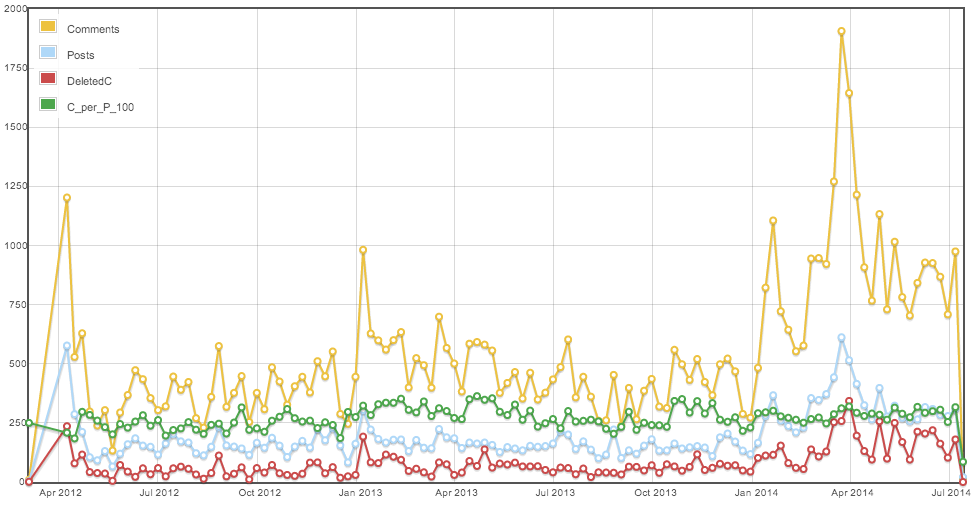## Does The Workplace have a particular problem with comment volume?
I looked at the ratio of comments to posts (including deleted of both) and tallied up the sites on the network that average more than 2.5 comments per post:
C/P Site
--- ----
4.08 Skeptics
3.8 Politics
3.06 Jewish Life and Learning
3.06 History
2.94 Mathematica
2.87 Puzzling Stack Exchange
2.81 Linguistics
2.78 Christianity
2.75 The Workplace
2.72 Theoretical Computer Science
2.63 Philosophy
2.57 MathOverflow
2.52 Code Golf
The list included quite a few meta sites that I removed (notably The Workplace Meta at 2.86) because most sites have more commenty meta than main sites. This isn't surprising because meta tends to be more discussion-oriented than factually-oriented. The bottom of the list is largely populated with sites that died of lack of activity or are dying and have fewer than 1 comment per post.
Considering the place workplace issues have on the [scale of subjectivity](http://blog.stackoverflow.com/2010/09/good-subjective-bad-subjective/), the volume of comments per post here doesn't seem too extreme. (The math-related sites are somewhat of an anomaly. They rely heavily on [comments for collaboration](http://meta.mathoverflow.net/a/247/36770).) It's natural that more comments will be needed to clarify questions and answers when the subject has no independent method of verifying the truth of assertions.
## Is the problem growing?
Well, it depends on how you look at it. I've forked your query and added a couple more lines:
[](http://data.stackexchange.com/workplace/query/207674/comments-per-week#graph)
The green `C_per_P_100` line is comments per post multiplied by 100 so that it will fit on the sameish scale. Comments per post has held steady while number of questions and answers has increased smartly since the beginning of the year. It's not so much that people are getting more commenty as that there are more things to comment on.
## Does this mean there's no comment problem?
Not at all. There are a few things I haven't looked at that might be a problem:
1. Comment distribution
If comments were spread evenly, 2.75 comments on each and every post seems not overwhelming. But if a few questions gather many comments (like http://workplace.stackexchange.com/questions/28338/how-do-you-decide-when-to-go-home-for-the-day) the problem can be quite noticable. For moderators especially, the automated ["too many comments"](http://meta.stackexchange.com/q/144694/1438) flag ensures that such posts are noticed.
2. Comment length
A few short comments are less problematic (at least in terms of space used) compared to the same number of long comments. We are working on making [single-line comments take just one line](http://meta.stackexchange.com/questions/235255/proposed-tweak-to-comment-ui-for-long-threads), which could further reduce the space consumed by short comments. (On the other hand, [long comments tend to be higher quality](http://meta.stackexchange.com/questions/204402/hide-trivial-comments). See the next point.)
3. Comment quality
I tend to think that comments on Skeptics, Mi Yodeya, Christianity, History, and Philosophy (the sites on the 2.5+ comments per post list that I'm familiar with) are fairly constructive on the whole. There aren't many [+1 comments](https://workplace.meta.stackexchange.com/questions/2634/are-1-for-something-about-the-post-comments-discouraged) as I recall. If comments are mostly of the chatty sort on The Workplace and not helpful in clarifying the post they are attached to, there could very well be a growing problem that's not reflected in any statistic. Given my reading of the linked meta posts, it sounds as if the quality of comments, rather than their volume _per se_, is the problem here.
## Summary
In order to solve a problem with comments, we need to clearly identify what, precisely, the problem is. My look at the data suggests that The Workplace includes more prolific commentary than most sites, but not excessively more. On the other hand, if comments distract from rather than augment the prime mission of a Q&A site, we may need to explore aggressive corrections.